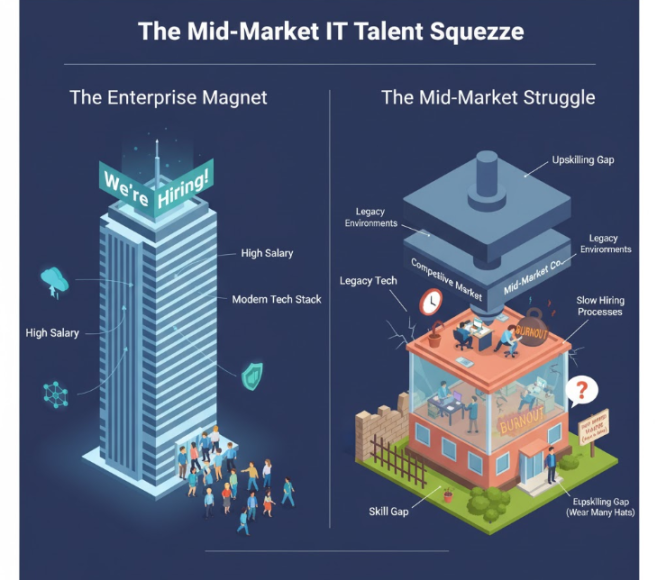The IT Talent Gap That Won’t Go Away
Mid-market companies sit in a uniquely difficult position: large enough to require specialized IT skills, but not large enough to compete with enterprise-level salaries or perks. Whether it’s cloud engineers, cybersecurity analysts, or AI specialists, the IT talent shortage continues to slow down initiatives, increase risk, and stretch existing teams thin.
As digital transformation accelerates—and with Gartner reporting ongoing demand for cloud and security roles—the gap between what mid-market IT teams need and what they can hire continues to widen.
This is where understanding why hiring is so hard becomes the first step toward fixing it.

Why Mid-Market Companies Struggle to Hire IT Talent
1. You’re Competing With Enterprise Giants
FAANG-level companies—and fast-growing startups—offer compensation packages mid-market firms can’t match. Engineers want learning opportunities, fast-paced projects, and senior mentorship that mid-sized organizations often struggle to provide.
2. Legacy Environments Discourage Top Engineers
Skilled engineers want to work with modern stacks. If your infrastructure includes outdated systems or disorganized environments, candidates may decline job offers. Microsoft and HBR both emphasize that engineers prioritize environments that support growth, automation, and modern toolchains.
3. Slow Hiring Processes Cost You Top Candidates
In-demand IT roles close quickly. Mid-market organizations frequently lose candidates due to:
- Long interview cycles
- Misaligned hiring committees
- Unclear job descriptions
- Poor role scoping
By the time a decision is made, the candidate is already gone.
4. No Clear Upskilling or Career Pathways
According to Gartner, IT professionals expect structured development. When companies lack:
- Certification pathways
- Cross-training opportunities
- Senior mentorship
they struggle to retain or attract high-caliber engineers.
5. Burnout Inside Existing Teams
Mid-market IT teams often run lean. This increases stress and creates reactive—not strategic—workflows.
Symptoms include:
- Ticket backlogs
- Overreliance on generalists
- Limited project execution capacity
This burnout further weakens hiring appeal.
6. Competition for Emerging Tech Roles
AI engineers, security specialists, and cloud architects are among the hardest roles to fill (NIST & industry reports). Mid-market firms simply cannot compete at the same scale, making engineering gaps an ongoing challenge.
How Mid-Market IT Leaders Can Close the Gap
1. Define Priority Skills With Precision
Vague roles = mismatched candidates. Instead, create structured role definitions aligned to business strategy.
2. Modernize Your Stack to Attract Better Talent
Even gradual infrastructure refresh efforts can significantly improve hiring appeal.
3. Build a Strong Talent Pipeline
Use channels like internal referrals, engineering communities, and specialized IT staffing partners.
4. Partner With a Specialized IT Talent Source
This is where OmniLegion provides value. As experts in engineering roles, cloud talent, and cybersecurity staffing, OmniLegion helps companies:
- Find vetted engineers
- Reduce hiring timelines
- Fill long-term or contract roles quickly
See how other companies solved similar challenges in our IT success case studies.
FAQs About the Mid-Market IT Talent Shortage
1. Why is IT talent harder for mid-market companies to hire?
Because they compete with enterprises offering higher pay, faster hiring processes, and modern tech environments.
2. What roles are hardest for mid-market teams to fill?
Cloud engineers, cybersecurity analysts, DevOps engineers, AI/ML specialists, and network architects.
3. How can mid-market companies improve their hiring success?
Streamline interviews, modernize infrastructure, and create clear upskilling and certification paths.
4. How do engineering gaps impact business growth?
They slow digital transformation, increase security risk, and limit the IT team’s ability to support strategic initiatives.
5. Can outsourcing IT roles help?
Yes. Using vetted talent partners can reduce risk, fill roles faster, and supplement internal teams.
6. Where can we find specialized IT engineering talent?
OmniLegion offers access to vetted U.S.-based and global engineers. You can explore talent options through the IT help request page.
Strengthen Your IT Team With the Right Talent Partner
The IT talent shortage isn’t going away—but mid-market leaders don’t have to face it alone. OmniLegion helps organizations build stronger, more resilient engineering teams through proven IT talent sourcing and strategic advisory.
Learn more or start a conversation through our contact page.

